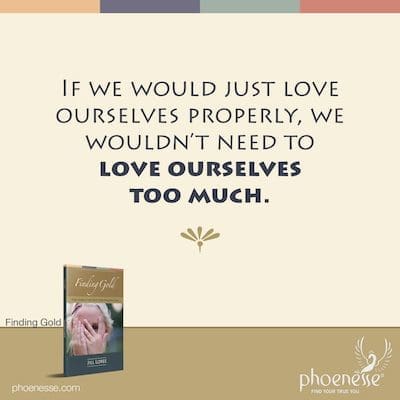Any truth can be distorted into an untruth. This is, hands down, one of the most powerful weapons of evil. Complete untruth is not the problem. But take something true in one setting and apply it over there, where it doesn’t belong—especially when it’s set up as a rigid rule—and we’re in dangerous territory. In this way, any truth can be bent into a distorted extreme that makes the truth null and void. And so it is too with self-love.
There’s a healthy version of self-love that exists in mature souls. But then if we fold in a few distorted currents, suddenly we end up with the wrong flavor of self-love. The crudest of the many forms is selfishness, where we want an unfair advantage or to put ourselves always in a better light than others.
Another twist on this theme is a kind of self-admiration that’s of a sickly, obnoxious nature. We can easily spot this in others and often just as easily identify in ourselves. It’s actually more harmful if this exists hidden in emotional layers that are not so obvious on the surface, especially if the person believes their conduct truly reflects their innermost self. Such self-delusion is worse than the worst outer deed.
So first we need to ferret out these kinds of distortions. Then we need to find out the reason these wrong kinds of self-love exist. Without this, just knowing about these twisted currents won’t do us much good. Because we won’t be able to straighten them out.
What we’ll usually find is that the cause of lack of self-love in the right sense is the same thing causing the distorted self-love. Simply put, if we don’t love ourselves as we should, we’re bound to go overboard in the wrong direction. We seek the wrong solution. But if we would just love ourselves properly, we wouldn’t need to love ourselves too much.

In the background of every young life there is a web of tangled feelings. These include guilt, a revolt against authority, and fears of not being good enough, not being accepted and not being loved. Together, these create attitudes of self-contempt and feelings of inferiority. Further, we despise ourselves because of the many ways we wish to shortchange life. We want the easy way. What kid doesn’t? This last desire is really at the root of our self-contempt and our feelings of inferiority. Nothing else comes close.
So to the extent we feel insecure, then to that extent we are wishing for an escape. This side of ourselves is hoping for a nice return, but has no interest in paying the price of taking the risk of exposure. Bottom line: we want to cheat life. When we find this hidden piece, we’ll find the root of our inferiority feelings and lack of self-respect. But not before.
Until then, we’ll stay stuck in the vicious circle that all these machinations create. The off-ramp we need to find is at the breaking point, when we decide we no longer want to shortchange life. Then we’ll get the dose of self-respect we need to heal. From that point on, we will be able to love ourselves in the right and healthy way. We’ll be able to walk away from the wrong kind of self-love that leads to self-contempt and makes us feel like garbage.
The sheer act of giving up our intention to cheat life has a purifying effect on us. One thing we’ll realize more clearly is that, in the spirit of all-is-one, it’s not possible to gain an advantage if it causes a disadvantage to someone else. We flat out cannot hurt another and have it be helpful to us. Believing otherwise is one of our human blindnesses, caused by the fact that we only see a small part of the whole picture.
But once we get a dose of some inner recognition, we’ll see more of the picture. And so we’ll see how wrong such thinking really is. To continue down the road of wrangling advantages over brothers or sisters who then get the shaft, ultimately takes a much higher toll than what we’d pay if we gave up on such “bargains.”
Whenever we discover wrong forms of self-love, some type of rejection—real or imagined matters not—must have played a role. Those are the two poles of this duality: wrong self-love and rejection. If we can unearth the source of where we have been rejected, we won’t be so hard on ourselves. And we’ll see how we tried to counteract this rejection by withdrawing from life, trying to shortchange it, or cheating life in some subtle way. This is the remedy—the way out.
In this way we can stop cutting off the good and healthy feelings we have about ourselves that are nesting next to our distorted reactions. That’s how we can learn to regain our gladness, our gratefulness, our joy in our goodness.

People, for a long time, have had the mistaken idea that to love oneself is sinful. But that’s just as misguided as any wrong kind of self-love. Nothing in the Bible or in any spiritual teaching of truth backs up this notion that we shouldn’t love ourselves. That would mean we don’t love the divine manifestation that we are. It denies the essence of who we are. It stops us from loving and helping others. So we need to persevere in sorting out the difference between healthy self-respect and distorted self-love.
One thing we struggle with is a mass image—a collective hidden belief—that its selfish and sinful to consider the self. This makes it hard to make a decision. It would seem that any decision that results in an advantage for the self is wrong. Well, maybe it is and maybe it isn’t. There are no hard and fast rules here. But decision-making is a requirement for living a healthy life. So how confusing is all that?
We must often make decisions where it’s not obvious what’s right and what’s wrong. Decisions can hurt people, and we don’t always have to be the one getting hurt. This statement seems to contradict what was said before—namely, that to cause a disadvantage to another cannot possibly be an advantage for us. But no, this is not a contradiction—both are true here on planet Earth.
Where we must make a decision that is going to hurt us or someone else, we are really looking at the final outcome of a whole series of deviations and chain reactions from the past. That’s a past we can neither change nor avoid. And not making decisions is not a way out either. In such cases, we must weigh everything with integrity and honesty. The outcome will differ each time.
We need to find the place of proper respect for ourselves. When we bump us against a popular hidden belief that says, “I do not deserve it,” we tend to overcompensate. Deep down, we’re really rebelling against a low opinion of ourselves. All this prevaricating is happening at a hidden level of feelings and may not even compute on an intellectual level. It is important to take the time to sort out these bundles of confused feelings. And we can only do this by working with someone who can help hold the flashlight as we peer into the shadows.

There’s something else that shows up in human personalities, and that is the role of punishment. In addition to self-punishment, there is a form that shows up in the child as well as in the immature adult. It is the desire to punish the other. And it arises when the other doesn’t follow our wishes. We may not witness this in actions as much as in inner attitudes.
Let’s start with the premise that each of us, as we were growing up, experienced hurt, disappointment, frustration and rejection, and those feelings made us feel like we wanted to die. Now we’re not talking literally die. But more like as a way to punish someone: “Then they’ll be sorry. They’ll see what they’ve lost and they’ll cry at my funeral.” So melodramatic. And we probably all know adults who still behave this way.
Most of us have gotten past this and no longer indulge this type of fantasy. Yet the germ of it may live on in sneaky little ways. Now we are more sophisticated in how we go about punishing others. We need to be on the lookout for this showing up when we feel slighted or rejected in some way. If we find it, score points for ourselves. That’s victory right there.
Try not to go down the rabbit hole of guilt. View these behaviors from a wise distance, which is the way to respond to any childishness still living in our souls. Because chances are really good, if we’re still human, we’re still carrying around some young aspects. See them. Smile at them. But don’t get sucked up in the drama.
Try too to figure out your own personal favorite form of punishment. There are as many ways to go about it as there are shades of grey. One way is through sickness. Does this not bring about tenderness, sympathy and some much-wanted consideration? Ruh roh. Seeing ourselves in this way will bring light and fresh air into our souls. Nothing else will bring us so assuredly back to health.
Return to Finding Gold Contents




